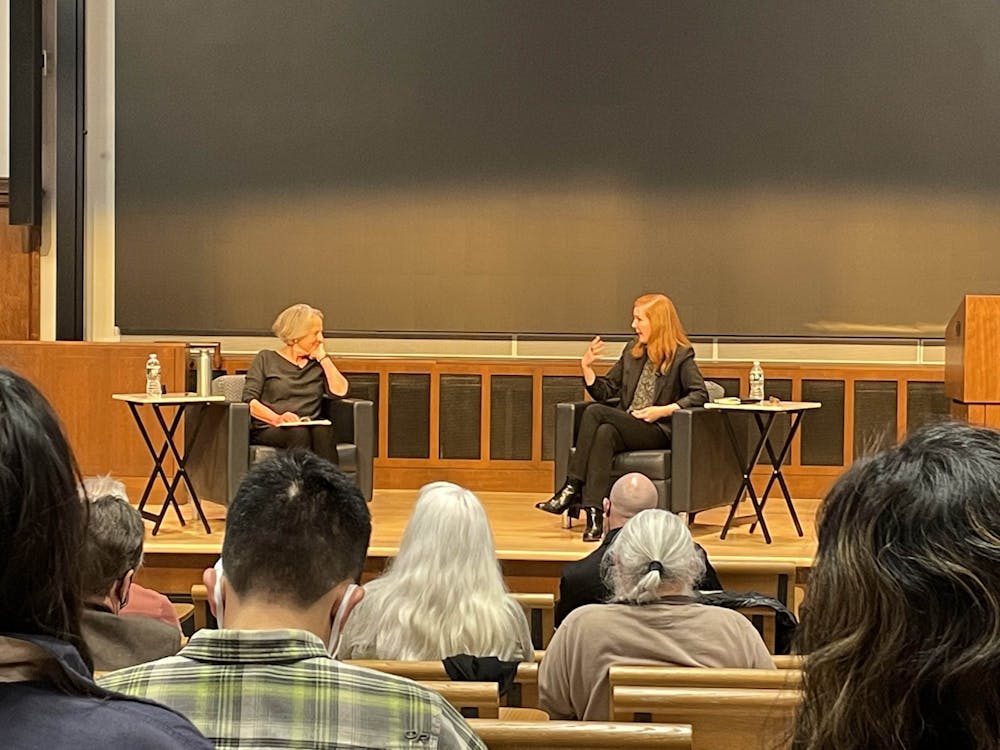In conversation with political theorist Wendy Brown GS ’83, prominent artificial intelligence (AI) scholar Kate Crawford spoke about the environmental, moral, and social dimensions of AI as a technology of data and physical extraction, including her thoughts on the technology’s future.
The conversation drew on Crawford’s latest book, “The Atlas of AI: Power, Politics and the Planetary Costs of Artificial Intelligence,” and covered the role of AI in a capitalist framework, its inherent biases, and efforts to democratize the technology.
Crawford is a Research Professor of Communication and Science and Technology Studies at USC Annenberg and a Senior Principal Researcher at Microsoft Research New York. Brown is the UPS Foundation Professor in the School of Social Science at the Institute for Advanced Study.
The event began with Crawford explaining her intentions for writing “Atlas of AI” to the audience.
“The common representation of Artificial Intelligence lies somewhere between science fiction and mathematical extraction,” she said.
The dangerous political implications of this representation led her to write about artificial intelligence.
“We have a tendency to narrow AI within technical paradigms,” she said. “But AI is as much social practices as it is technical practices. And it’s also the infrastructures that subtend these systems.”
Since AI is neither entirely artificial nor intelligent, Crawford said that she considered AI to be an “absolute misnomer” but still a useful, evocative term.

Crawford addressed three of her book’s eight chapters: “Earth,” “Labor,” and “Data.” Speaking to the forms of human labor needed to make current AI and the increasing tendency to treat humans like robots through AI, Crawford critiqued the application of artificial intelligence to social institutions like education and healthcare.
“What I’ve seen for so many years is that AI commonly widens underlying power asymmetries,” she said.
Brown amplified “Atlas of AI’s” role in dispelling the myths of “AI as clean-tech, labor-saving, neutral or unbiased, and merely a technology.”
Brown also touched on Crawford’s interpretation of AI in the context of modern capitalism.

“AI is entangled with capital. It depends on it; it enhances capital. But periodically, you say AI is capital,” she said.
This led to further discussion on AI as an extractive industry. Brown summarized Crawford’s vision for necessary future action to mitigate the environmental, political, and social implications of AI.
“The democratize AI movement is a lot like democratizing finance. There’s a call for more universal access, developing platforms that reduce entry barriers. Here, democracy itself is being reduced to inclusion,” she said.
Additionally, Crawford spoke about the need for interdisciplinary training around computer science, centering the humans that are affected by these systems every day.
Citing the example of recent protests in New York City against facial recognition in public housing, Crawford said, “the muscle we really need to exercise is the politics of refusal.”
The dialogue was then opened up to pre-submitted questions from the audience, both those present in-person and those attending through Zoom.
“How dependent are future generations on technology, or AI in specific?” an audience member asked.
Crawford explained that whether applying for university or jobs, the younger generation is constantly being assessed and profiled by AI in ways beyond their control.
Another question explored the roles of biases in AI.
“The systems are in some ways telling us the structural problems we already have,” Crawford said, referring to unintentional gender biases in the Apple Card algorithm and Amazon’s resume algorithm.
The session concluded with Crawford talking about Jeff Bezos ’86 and his “radical vision” for Blue Origin and technology facilitating life beyond Earth.
“I would much rather we look at how we can repair and share the planet that we have that we know sustains life than look at fantasies that are more ideology than fact,” she said.
The event was held on Oct. 27 at 5 p.m. by Princeton Public Lectures (PPL) as part of the Louis Clark Vanuxem Lecture series. It is PPL’s first in-person event since the outbreak of the COVID-19 pandemic.
Tara Agarwal is a news contributor for the ‘Prince.’ She can be reached at ta3150@princeton.edu.








